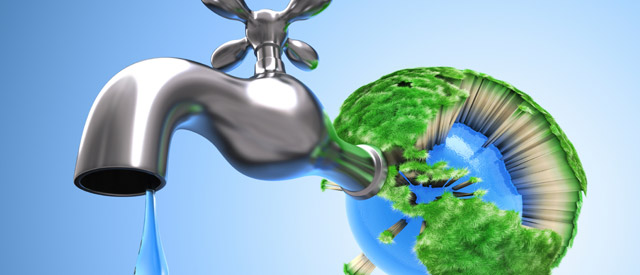 Reflections on the right to water: what is at stake as we move towards Rio+20?
Reflections on the right to water: what is at stake as we move towards Rio+20?
This week, as the world celebrates World Water Day, some countries at the United Nations are trying to remove the reference to ‘right to water’ from the document that will guide the international development path in the coming decade.
It was less than two years ago, in the summer of 2010, that the United Nations General Assembly (UNGA) adopted a resolutionrecognising water as a human right. This was followed by the adoption of a resolution on ‘human rights and access to safe drinking water and sanitation’ by United Nations Human Rights Council (UN HRC), which made these rights legally binding. The recognition of right to water by these UN bodies, and the developments since – such as the appointment of a Special Rapporteur on right to water and the resolution by the World Health Assembly which recognises right to water – have helped place these rights on the global agenda.
These successes were partly the result of collective efforts of water justice activists over the last 10 years. Our own advocacy on right to water was in direct response to the reference to water as a “need” [instead of a right], in the Ministerial Declaration of the 2nd World Water Forum in 2000.
But these efforts have been met with consistent pushback from some quarters. The efforts to undermine the recognition of the right to water have been most visible at the triennial World Water Forum. Starting with the second World Water Forum in 2000, it has steadfastly refused to recognise the right to water. This was the case at the 3rd World Water Forum in 2003 (which followed the UN General Comment in 2002 on right to water), at the 4th World Water Forum in 2006 (where several governments led by Bolivia asked that the Ministerial recognise water as a human right) and at the 5th World Water Forum (to which the UNGA president sent a letter affirming the need to recognise water as a human right, and at which 24 governments came out with counter-declaration recognising water as a human right).
And yet again, in the lead up to the 6th World Water Forum earlier this month (March 12-17, 2012), the draft ministerial declaration did not clearly affirm the right to water, despite the fact that it has now been recognised by both by the UN General Assembly and by the UN Human Rights Commission. Expressing her surprise, the Special Rapporteur on right to water, warned that “the outcome of the World Water Forum may result in ‘solutions’ built on faulty foundations.” This is surely a pointed reference to the slogan of the 6th Forum that "It’s time for solutions and commitments”.
Instead of unequivocally reaffirming the ‘the human right to safe drinking water and sanitation’, and explicitly committing to the full implementation of the same, the draft ministerial declaration only committed to accelerate the full implementation of ‘human right obligations relating to access to safe drinking water and sanitation’. The issue of whether access to safe drinking water and sanitation is a human right was left open for interpretation.
To many groups in civil society, it was clear that the draft Ministerial Declaration fell short of commitments that virtually all UN Member States had already made in multiple fora. Over 40 international and national networks and organisations issued a joint call to the 6th World Water Forum, asking that ‘human right obligations relating to access to safe drinking water and sanitation’ be replaced by ‘the human right to safe drinking water and sanitation’, or failing that, they abstain from endorsing the declaration.
Unfortunately the Ministerial Declaration of the World Water Forum that came out on 13th March neither took account of these suggestions nor paid attention to the warning by civil society groups that ‘a Ministerial Declaration containing retrogressive language on the right to safe drinking water and sanitation would still set a negative precedent, which a small number of States will use to try to undermine progress on the right to safe drinking water and sanitation at the United Nations level and in other international processes’.
While the Ministerial Declaration of the 6th World Water Forum is neither legally binding, nor does it carry the political and moral authority of a UN resolution adopted in accordance with UN rules and procedures, it appears that the warning by civil society was spot on. This week in New York, a handful of governments have been trying to remove the reference to right to water from the draft outcome statement being prepared for Rio+20, the 20th anniversary of the first earth summit held in Rio in 1992. The current draft was formulated on the basis of extensive consultation with governments, private sector and civil society. Despite many shortcomings, this draft outcome document affirms a rights based approach to sustainable development, and clearly refers to the right to water.
What is at stake?
To begin with, this language weakens the clear affirmation that governments need to determine how to realise the right to water, and leaves room open for States to individually determine whether their human rights obligations require them to realise the right to water and sanitation for all.
The right to water is also recognised as a useful tool by communities who are impacted by developments that reduce their access to safe water. A clear affirmation of these legally binding rights (as per HRC resolution and/ or national constitutions) in national and international rules, regulations and policy documents become extremely important for pursuit of decisions that are advantageous to vulnerable communities.
An important corollary to the recognition of this right, is the attention it draws to the large number of people for whom these rights are not a reality yet. A case in point is the way the Special Rapporteur on right to water has been able to highlight violations of right to water in countries that she visits.
Globally, there is an increasing attempt to promote policies that will treat water primarily as an economic good, at the cost of water as a fundamental right. Several Rio+20 initiatives on the green economy also follow an approach that narrowly focuses on resource use efficiency and economic growth. In the absence of effective regulatory frameworks, safeguards and the clear recognition of water as a fundamental human right, corporate interests will continue to supersede marginalised, low-income communities and smallholder farmers. The stakes are especially high this World Water Day, as we move towards Rio+20.
| Contact information |
Shiney Varghese, Senior Policy Analyst, Institute for Agriculture and Trade Policy
|
|---|---|
| News type | Inbrief |
| File link |
http://www.stakeholderforum.org/sf/outreach/index.php/inf1day5home/689-inf1day5item9 |
| Source of information | http://www.stakeholderforum.org/sf/outreach/index.php/inf1day5home/689-inf1day5item9 |
| Keyword(s) | right to water |
| Subject(s) | DRINKING WATER , DRINKING WATER AND SANITATION : COMMON PROCESSES OF PURIFICATION AND TREATMENT , RIGHT |
| Relation | http://www.emwis.net/topics/WaterRight |
| Geographical coverage | n/a |
| News date | 23/03/2012 |
| Working language(s) | ENGLISH |
 you are not logged in
you are not logged in





